- Learning time
- 60 minutes
- First play time
- 180 minutes
Colonial: Europe´s Empire Overseas
Designed by: Christophe Pont
Colonial represents a vast swathe of empire expansion undertaken in Europe’s morally dubious past. It’s not a celebration of this time, but asks the players to reenact a period of history where the idea of ‘civilized’ countries implementing colonization was represented as some kind of benevolent act.
Colonial’s beautiful board shows a map of the world with all regions who actually have been subject to colonization there to be exploited. The Americas, Africa, southern Asia and Australia are all surrendered to the whim of western powers – represented here by the players. During the game your aim is to establish trade routes and colonies, which in turn give you Prestige Points. The first player to ten Prestige Points instantly wins the game, so it’s a race of sorts.
Play moves forward through the use of cards. Each player has a deck of six cards, each with two characters on them that have their individual powers – the Merchant ships goods, the Explorer establishes new trade routes (or attempts to: via dice-rolling) and so on. Players choose five of their six cards and lay them in a row left to right in the order they wish to play them. Then one by one all cards are revealed and actioned. The advantage of having two character powers on each card means that if your best-laid plans go awry, you can react by using a different character if need be. Once all cards have been played and actioned, there are four short phases of building up merchant fleets and navies as well as paying interest on loans, for those players who have taken them.
You may take a loan early in the game because having a lot of money obviously gives you more power to expand your empire. The downside is you cannot win – even if you get ten prestige points – until your loan is paid off, and it steadily accrues interest throughout the rounds…
We won’t go through all the character cards here, but suffice to say your short-term aim is to establish prosperous trade routes that keep money coming in. Your long-term aim is to expand your empire, and thus collect Prestige Points! The things in your way are the understandably miffed locals, who don’t necessarily welcome colonization, and the other players, who can not only stir up trouble for you in individual territories by starting rebellions, but can also declare war on you; which means being attacked not only in every territory you occupy on the board, but also your navy fleet – and even your treasury, leaving you cash-poor!
Finally in the four corners of the board are the Progress tracks – you can pay money to move up on these and make your Economy, Seafaring, Navy and Logistics problems easier to negotiate by creating better infrastructure in them.
The guru's verdict
-
Take That!
Take That!
There is lots of opportunity to interfere with each other in Colonial, from provoking trouble for each other to full-on, destructive war. Definitely a game for adults and older children.
-
Fidget Factor!
Fidget Factor!
Although a first play will be long, you'll notice that as you get to grips with it Colonial actually begins to play very fast.
-
Brain Burn!
Brain Burn!
The puzzler here is what order to play your cards. You don't want to be playing a character who you don't have the funds to action, so the challenge is to try and chain your cards together like cogs in a machine!
-
Again Again!
Again Again!
Colonial is a long game, but a fast-moving one after an initial play. There are a few special rules and exceptions (it's trickier to get into the Americas and Australia, for instance, and anyone shipping slaves will get their comeuppance in the latter stages of the game) but the basic rules are reasonably simple and the rulebook is one of the more accessible ones.

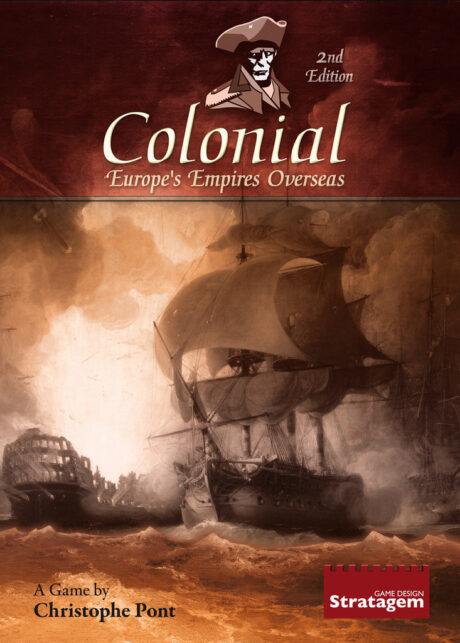
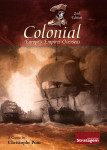
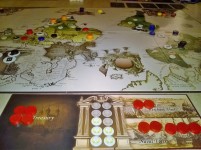



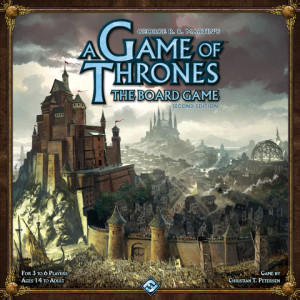
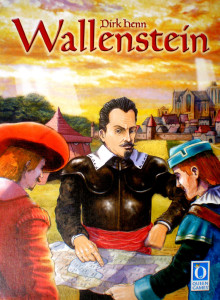

Sam says
Colonial will take a bit of time to get your head around - if you're coming straight from Catan or Carcassonne say, it might feel unwieldy in comparison. And if you're new to board games and want to dip your toes in, then start elsewhere. But if you're looking for something that balances expansion and war with politicking and economy, then what Colonial does do is package those things into a game that - once you know it - plays fast. The cards having two roles also allows to you play reactively, which saves it from being rather dry and plodding. The caveat here is theme; whilst the game isn't a celebration of colonialism - in fact the game is ultimately punitive to the factions that utilise slavery to get ahead - as players you are recreating the exploitative roles of world powers in real history- and whilst some can view the theme as historically interesting or instructive, others may not want that particular box ticked.